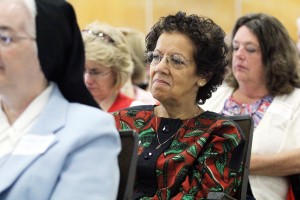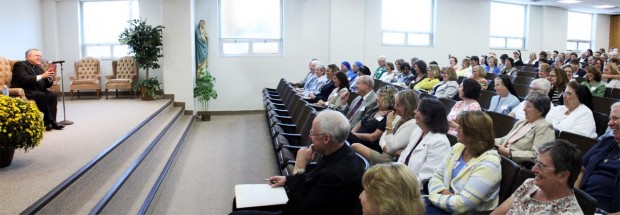The 150 or so catechists who attended the Sept. 13 Fall Professional Development Day at St. Charles Borromeo Seminary were in for a special treat – their own catechist for the day was Archbishop Charles Chaput.
His topic — issues to consider in this election year, especially life issues — was at the top of the agenda.
“A presentation by the Archbishop is most worthwhile,” said Father John J. Ames, archdiocesan Deputy Secretary for Catechetical Formation. “I think we recognize issues surrounding life and the Church’s involvement in trying to transform the culture is as important today as ever and so for our catechists and DREs to be familiar with some Church teaching is invaluable.”
It was also a great opportunity for them to experience the dynamic style of the Archbishop up close and personal.
[hotblock]
His topic was “Render Unto Caesar,” taken from the title of his 2008 book, “Render Unto Caesar: Serving the Nation by Living Our Catholic Faith in Political Life.”
Actually, the book has just been re-released at the suggestion of the publisher, Doubleday, with a new forward and a new cover. In an election year it’s a great read for parish book clubs with a soft cover price of $14, (Amazon $11.20). Royalties for the book, the Archbishop said, are donated to a special fund to assist the poor.
The book, of course, takes its title from the Matthew 22, where Jesus confounds the Pharisees by telling them “Render unto Caesar the things that are Caesar’s and render unto God the things that are God’s.” It was quite clear from the Archbishop’s talk and the question-and-answer session that followed that he believes we owe a great deal more to God than we owe to Caesar.
“When you appear before God He is not going to ask if you were a Democrat or a Republican, He is going to ask if you were a good Christian,” he said. “We have to vote as Christians.”
It is mindless, he suggested, to vote a straight ticket for any party, because no party supports the whole teaching of the Church.
Clearly, there are many issues one must consider before entering the voting booth.
As one questioner posed it, one candidate might have pro-life and family values but economic policies that will drive the country in the wrong direction, while another person might have sound economic policies but positions on pro-life and other issues that are against Catholic teaching. How does one resolve that?
“I could never vote for somebody who favors abortion,” Archbishop Chaput said. “If you can kill unborn babies, who can’t you kill?” If both parties ran a pro-choice candidate, “I wouldn’t vote for either,” he said.

Linda Love, St Benedict parish, listens as Archbishop Chaput discusses issues to consider this election year.
In his answers the Archbishop was especially critical of Catholic legislators, who sacrifice their Christian values in order to receive their party’s nomination and eventual election. And many Catholics who simply vote on party line also share the blame; in his view had they stood up to the so-called elite, when the abortion issue came up, it would not be an issue today. “It’s the quiet Catholics who led us into to this. If they had told their party no, it wouldn’t have happened,” he said.
In short, the archbishop maintains, “We need to be witnesses to our faith in the public square.”
Linda Love, who attended the workshop for Philadelphia’s St. Benedict Parish, said after the session, “He certainly tells it the way it is and his personal conviction is most impressive. It’s what he believes, he doesn’t pull punches and yet he speaks with love. It is very powerful.”
***
Lou Baldwin is a freelance writer and member of St. Leo Parish, Philadelphia.
PREVIOUS: Archdiocese’s shore home for priests sold for $4.5 million
NEXT: Pastor of Ascension Parish suspended for abuse allegations



“It’s what he believes, he doesn’t pull punches and yet he speaks with love.”
I will try to do the same with this comment.
Archbishop Chaput, in his book and in his lectures, is contributing to an ages-old misunderstanding of the meaning of the render-unto-Caesar told in the Gospels of Matthew (Ch. 22), Mark (Ch. 12) and Luke (Ch. 20) incident and the works Jesus spoke at the time.
Jesus was asked by some deceivers sent by the chief priests “to catch him in his words”, “Is it right to pay taxes to Caesar or not? Should we pay or shouldn’t we?” (Mk) “They hoped to catch Jesus in something he said so that they might hand him over to the power and authority of the governor.” (Lk) Pilate, the governor was the equivalent of district director of taxation for Judea who could brook no resistance to Caesar tax if he wanted to keep his head.
Jesus’ ambiguous response befuddled the deceivers, who knowledge of Scripture was weak. To Scripture scholars such as the chief priests, his ambiguous answer was perfectly clear: “The earth is the Lord’s and all that is in it. (Psalm 24, verse 1) That leaves nothing for pooor old Caesar and his taxes, and nothing is what Jesus told the cognoscenti, including his disciples, to pay. It was for that reason the chief priests had Jesus arrest just a day or two later. Then they dragged him before Pilate and truthfully charged, ““We have found this man subverting our nation. He opposes payment of taxes to Caesar..He stirs up the people all over Judea by his teaching. He started in Galilee and has come all the way here.” For that reason alone, any Roman tax authority would do as Pilate did: crucify Jesus.
Chaput: “When you appear before God He is not going to ask if you were a Democrat or a Republican, He is going to ask if you were a good Christian…We have to vote as Christians.”
With all due respect, those who consider themselves disciples of Jesus will not vote, nor pay any taxes they can possibly avoid without resorting to force or lies, and will have nothing to do on a voluntary basis with the state, which in the guise of the Roman state murdered Jesus. They won’t hold office, they won’t serve in the military (God forbid), they won’t salute the flag, they won’t serve on juries, they won’t work for government nor take any government benefit offered them. The state is a violent human invention. Disciples of Jesus are precluded from associating or cooperating in its violent ways by the strictures enunciated in Jesus’ Sermon on the Mount.
Bishops, cardinals and popes are religious authorities. In their positions, if not in their persons, they are much like the chief priests and scribes who were Jesus’ nemeses.